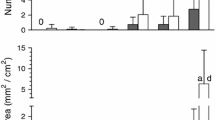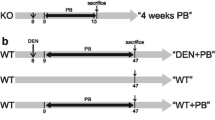Abstract
In rats and mice, nafenopin is a nongenotoxic hepatocarcinogen, which induces hepatic DNA synthesis and enzyme induction both in vivo and in hepatocyte cultures in vitro. However, humans and guinea-pigs are considered to be non-responsive to the liver growth effects of peroxisome proliferators (PPs). The ability to stimulate cell replication coupled with the ability to suppress apoptosis is thought to underpin the carcinogenicity of nongenotoxic carcinogens such as PPs. Previous studies in this laboratory have shown that in rats in vivo and in vitro nafenopin suppressed spontaneous hepatocyte apoptosis and that induced by the physiological negative growth regulator transforming growth factors β1 (TGFβ1). In addition nafenopin suppressed apoptosis in cultured hepatocytes from guinea-pig and hamster. The effects of PPs on apoptosis in human hepatocyte cultures is not known. To correlate these previous in vitro findings to the known species differences in hepatocarcinogenicity of PPs we have investigated the effects of nafenopin on guinea-pig liver growth in vivo. Also, we have examined the effects of nafenopin on apoptosis in cultures of human hepatocytes, a valuable model for human risk assessment. Nafenopin did not inhibit either spontaneous or TGFβ1 induced apoptosis in human hepatocytes in vitro. Administration of nafenopin to guinea-pigs in vivo produced none of the changes seen previously in responsive species, such as rats and mice. There was no change in liver/body weight ratio, peroxisomal volume of hepatocytes or DNA synthesis as determined by incorporation of bromodeoxyuridine and there was no suppression of apoptosis. The lack of response to nafenopin in guinea-pigs in vivo and human hepatocytes in vitro provides further evidence that these species may be refractory to the liver growth effects of PPs despite the ability of guinea-pigs and humans to respond to PPs by alterations in lipid metabolism. The data presented add to our overall understanding of species differences in response to the PP class of rodent nongenotoxic carcinogens.
Similar content being viewed by others
Author information
Authors and Affiliations
Additional information
Received: 9 June 1998 / Accepted: 21 September 1998
Rights and permissions
About this article
Cite this article
Hasmall, S., James, N., Soames, A. et al. The peroxisome proliferator nafenopin does not suppress hepatocyte apoptosis in guinea-pig liver in vivo nor in human hepatocytes in vitro. Arch Toxicol 72, 777–783 (1998). https://doi.org/10.1007/s002040050573
Issue Date:
DOI: https://doi.org/10.1007/s002040050573




